|
|
|
Sort Order |
|
|
|
Items / Page
|
|
|
|
|
|
|
| Srl | Item |
| 1 |
ID:
148282
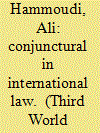

|
|
|
|
|
| Summary/Abstract |
This article will detail an event of revolutionary action in the historiography of anti-colonial and anti-imperial struggle in Iraq, namely al-Wathba (‘the leap’) of 1948, utilising it as an example to address the limitations of the methodology and analysis of Third World Approaches to International Law (TWAIL) scholarship. I will argue that there is a disconnect between notions of agency and structure in TWAIL analyses and that therefore TWAIL scholars should consider studying the conjunctures that allowed certain movements ample room to struggle against the imperialism of international law in the first place. I will use the example of the Wathba to illustrate how a conjunctural analysis may be undertaken, analysing its implications for the international legal order. I will then move to highlight the significance of labour to the conjuncture in question. Finally, I will demonstrate how events like the Wathba illuminate the transient and provisional nature of the foundations of international law, while emphasising its structural constraints.
|
|
|
|
|
|
|
|
|
|
|
|
|
|
|
|
| 2 |
ID:
148281
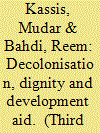

|
|
|
|
|
| Summary/Abstract |
Taking Palestine as the focus of inquiry, and drawing on our experiences as co-directors of Karamah, a judicial education initiative focused on dignity, we reflect on the attributes of colonisation and the possibilities of decolonisation in Palestine through development aid. We conclude that decolonisation is possible even within development aid frameworks. We envision the current colonial condition in Palestine as a multi-faceted, complex and dynamic mesh that tightens and expands its control over the coveted colonial subject but that also contains holes that offer opportunities for resistance or refusal. We turn to Karamah to illustrate how some judges have insisted on a professional identity that merges the concepts of human dignity and self-determination and ultimately rejects the colonial condition inherent in both occupation and development aid. We conclude that in this process of professional identity (re)formation, members of the Palestinian judiciary have helped reveal the demands of decolonisation by demonstrating their commitment to realising human dignity through institutional power, and bringing occupation back into international development discourse.
|
|
|
|
|
|
|
|
|
|
|
|
|
|
|
|
| 3 |
ID:
148286
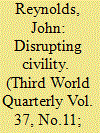

|
|
|
|
|
| Summary/Abstract |
This paper is a reflection on the role of intellectuals in engaging with Palestinian solidarity movements and liberation discourses, and on the place of international lawyers specifically within that context. The paper considers ‘the question of Palestine’ as a rigorous test for intellectuals in the Global North today, and examines particular debates over free speech, civility and balance that unfolded in the wake of Israel’s 2014 war on Gaza. It considers the interventions of international lawyers in these debates with reference to Edward Said’s ‘amateur’ and ‘professional’ intellectuals, and explores ways in which anti-colonial international lawyers (as amateur intellectuals) can transcend prevailing professional orthodoxies to deploy language, arguments or tactics that rupture liberal legal processes and narratives on Palestine.
|
|
|
|
|
|
|
|
|
|
|
|
|
|
|
|
| 4 |
ID:
148284
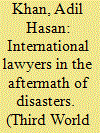

|
|
|
|
|
| Summary/Abstract |
In the present lives in the postcolony are beset by relentless disasters, generating great suffering and loss. How should an international lawyer conduct herself in response? Resisting the urge to construct these times as entirely unprecedented, this article attempts a response by drawing out the conduct of two ancestral Third World international lawyers responding to disasters in their own time. It reveals how disasters never simply occur but are actively produced by particular modes of conduct deployed by international lawyers. From their conduct we learn how to attend to the tasks of justice and responsibility in the aftermath of disaster by being responsive to the suffering and by recognising the disastrous effects of our action. We also learn how attending to the tasks of inheritance is vital for this.
|
|
|
|
|
|
|
|
|
|
|
|
|
|
|
|
| 5 |
ID:
148287
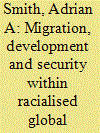

|
|
|
|
|
| Summary/Abstract |
Within international labour migration, received wisdom holds that the migration-development and migration-security couplings co-exist in discord. The migration-development-security relationship is perceived to swing like a pendulum. In this article I reject the simple pendulum formulation which suggests security stands at odds with development. I examine the ways in which migration controls occur through and reproduce racialised global capitalism. Capitalist development and security work together to undermine the resistance struggles of those designated migrant labour. Students of labour migration must refuse the game of balance and instead entrench our analytical efforts within the creative self-activities of ordinary working people.
|
|
|
|
|
|
|
|
|
|
|
|
|
|
|
|
| 6 |
ID:
148283
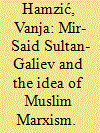

|
|
|
|
|
| Summary/Abstract |
This paper revisits the idea of Muslim Marxism, as espoused through the life and work of the Tatar Muslim and Bolshevik intellectual and revolutionary Mir-Said Sultan-Galiev (1892–1940). I argue that Sultan-Galiev’s oeuvre – a unique synthesis of Marxist, Muslim modernist, anti-colonial and Third World praxis – represents a path-breaking take on Muslim selfhood and practices of belonging.
|
|
|
|
|
|
|
|
|
|
|
|
|
|
|
|
| 7 |
ID:
148279


|
|
|
|
|
| Summary/Abstract |
The life of a Third World international lawyer is devoted to resistance to the norms of international law designed by agents with power to promote the interests of the powerful sections of the international community. Increasingly the instrumental norms of international law are fashioned through the use of private power, making the positivist claim that public international law is a law between states illusory. The task of this paper is to identify a framework of common concerns so that a collectivity of Third World lawyers can work together, examine how mechanisms of power can be countered, and devise a confrontational strategy.
|
|
|
|
|
|
|
|
|
|
|
|
|
|
|
|
| 8 |
ID:
148280
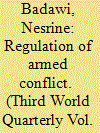

|
|
|
|
|
| Summary/Abstract |
This paper calls for comparative analysis of international humanitarian law and Islamic laws regulating armed conflict by focusing on the underlying assumptions and interests informing both systems (rather than on rule-based comparison). It argues that examination of the biases inherent to each legal system can potentially inform scholars to understand better the paradigms shaping each of them. In doing so, the paper builds on contextual and critical interpretations of both fields of law to assert the need for ‘critical comparativism’ rather than functionalist comparativism. Unlike functionalist comparativism, which treats international law as the ‘objective’ benchmark against which other legal traditions are measured, ‘critical comparativism’ treats the two legal systems examined as alternative manifestations of power structures which, when contrasted against each other, help shed more light on the inherent bias in each legal system.
|
|
|
|
|
|
|
|
|
|
|
|
|
|
|
|
| 9 |
ID:
148285


|
|
|
|
|
| Summary/Abstract |
In starting from the simple question, ‘Why didn’t the field of constitutional studies ever generate a school of thought akin to TWAIL?’, this article seeks to sketch the contours, obstacles and promises of Southern constitutionalism. In confronting the intra-, meta-, and extra-disciplinary challenges to such a project, the article defines the ‘South’ of Southern constitutionalism, not the ‘South’ of the developed ‘North’, but rather the ‘South’ of the modernist hopes in – and the post-modernist disappointments with – the templates of Western constitutional imagination.
|
|
|
|
|
|
|
|
|
|
|
|
|
|
|
|
| 10 |
ID:
148278
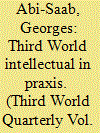

|
|
|
|
|
| Summary/Abstract |
In his closing keynote address for the TWAIL Cairo Conference, Professor Georges Abi-Saab engages with the conference theme ‘On Praxis and the Intellectual’ by considering the diverse roles that can be played by Third World international law intellectuals in trying to transform theory into social practice. He commences with an overview of the Third World’s engagement with international law thus far in the form of a ‘three act psychodrama’. Following from this, he explores the meanings of the terms ‘intellectual’ and ‘praxis’, noting that not all international lawyers are the former, and breaking the latter down into several stages in the spectrum between reflection and action. Professor Abi-Saab concludes with some examples of praxis from personal experience, including as a professor, teacher, and scholar of international law, ghostwriting for the UN Secretary-General, participation in country delegations, and as judge and arbitrator in numerous courts and tribunals. Through these examples he illustrates some of the different tactics available to the Third World intellectual including confrontation, participation, or operation ‘behind enemy lines’.
|
|
|
|
|
|
|
|
|
|
|
|
|
|
|
|
| 11 |
ID:
148277
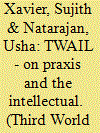

|
|
|
|
|
| Summary/Abstract |
This Special Issue emerges from the Third World Approaches to International Law (TWAIL) Cairo Conference in 2015 and addresses the conference theme, ‘On Praxis and the Intellectual’, by focusing on different aspects of the intellectual as a political actor. In introducing this Issue, we provide some background to the TWAIL network, movement, event, and publications; and delineate our own understandings of scholarly praxis as editors and conference organisers. Broadly, we understand praxis as the relationship between what we say as scholars and what we do – as the inextricability of theory from lived experience. Understood in this way, praxis is central to TWAIL, as TWAIL scholars strive to reconcile international law’s promise of justice with the proliferation of injustice in the world it purports to govern. Reconciliation occurs in the realm of praxis and TWAIL scholars engage in a variety of struggles, including those for greater self-awareness, disciplinary upheaval, and institutional resistance and transformation.
|
|
|
|
|
|
|
|
|
|
|
|
|
|
|
|
|
|
|
|
|